- Home
- Jim Thompson
Wild Town Page 7
Wild Town Read online
Page 7
The shooting cost him two years in the Army stockade. He was also sentenced to a dishonorable discharge, but a higher court toned that down to a discharge under honorable conditions, also remitting six months of his previously forfeited pay.
He was in San Diego, looking around and resting on the money when he met his wife-to-be.
It happened one Sunday, at the city’s justly famous zoo. Bugs was standing in front of the monkey cages, one of the crowd of people tossing peanuts through the bars and watching the animals’ antics. He was standing there gawking and grinning, and thinking he looked pretty nice in his new suit of clothes, when a monkey reached behind him suddenly, came up with a brimming handful of ordure, and flung it all over him.
Talk about messes. He looked like he’d just crawled through a sewer. And everyone was laughing at him, really knocking themselves out. And he didn’t know what the hell he was going to do; how he could get across town ten miles to his room where he could wash up and change clothes.
Then a hand touched his arm, closed over it gently, and he looked down into a face that wasn’t laughing, but only tender and sympathetic. And he realized later that a dame didn’t get a pan on her like that in less than forty years. But at the time, she looked like an angel to him.
She had a little apartment nearby. He was more than welcome to come there and get himself in order. Gratefully, he accepted the invitation.
He bathed and scrubbed himself, while she worked over his clothes in the kitchen. Then, with a sheet pulled around him, he sat down on the bed to wait for the return of the garments. She came in with them, finally, dressed in a robe. She started to hand them to him, and somehow accidentally-on-purpose her robe fell open. And apparently she’d had some laundry to do of her own, because she sure as hell wasn’t wearing any.
Naturally, she was thoroughly mortified. As she put it, she felt just like sinking through the floor. By the way of compromise, she sank down on the bed instead, where, needless to say, her nudity was promptly covered with more of the same.
She wept bitterly afterwards. Bugs almost made with the tears himself. It was her first experience with a man—possibly excepting the members of the Pacific Fleet and the local Marine contingent—and he was dismayed at having despoiled her.
They were married in Arizona the next day. It was the very least he could do—to make her an honorable woman.
Two weeks later, when he came down with practically every disease in the venereal category, he was still too unawakened to connect her with them, and was completely satisfied with her theory as to how they had been contracted.
Fortunately, for himself, at least, he had just taken a job where a physical examination was necessary. And with the ancientest of medical jokes, the doctor rid him of his childish naivete.
“A toilet stool, eh?” he said. “Do you sleep with a toilet stool?”
“Of course, I don’t.” Bugs frowned. “I sleep with my wife.”
“No one else? Don’t do any playing around? Well, then,” said the doctor. “Well, then, young man?” And he spread his hands significantly.
Bugs almost killed her. Except for the arrival of the police, he might have been beating on her yet.
Arrested and held for trial, he would give no reason for the assault. He had too much pride; he was too ashamed of being taken for a sucker.
He was sentenced to six months in the county jail, plus permanent banishment from the state. Released, he started drifting, arriving eventually in Texas.
In the mushrooming towns-become-cities, municipal employees were at a premium—particularly if they were young and able-bodied and had anything at all in the way of police experience. Bugs fitted those specifications. He also was an honorably discharged veteran. True, he had a bad record, but in those hectic days a man might work a very long time before his record caught up with him, if it ever did.
Bugs became a city police patrolman. After three months, during which there was an almost one hundred per cent turnover in the department’s personnel, he was promoted to plain clothes. It was in that job that he landed in his biggest and worst scrape.
One of the other dicks was a wild-eyed, constantly grinning boob with a penchant for practical jokes. He didn’t bother the other guys much, and so was fairly well-liked by them. But to Bugs, who had been fiendishly singled out as a born butt, he was nothing less than maddening.
He was going off watch one evening when the guy lurched through the door of the locker-room. He was more wild-eyed than usual; drunk apparently. Yanking out his gun, he announced that he had taken as much off of Bugs as he intended to, and that now he was going to kill him.
Murmuring protests, pulling long faces, the other dicks got out of the way. Among them was one, who, only a moment before, had asked to take a look at Bugs’s gun, with a view of making a swap.
Bugs spoke to him out of the corner of his mouth; begged him for God’s sake to return the weapon. The man didn’t seem to hear him. Sweating, he whispered a plea for someone to do something—to step in and stop this character. No one seemed to hear that entreaty either. Or, ostensibly, they were too shocked or frightened to heed it.
Bugs let out a roar of fear. Leaping sideways suddenly, he snatched back his borrowed gun, whirled and fired. He emptied the chamber. And at that distance, of course, he couldn’t miss.
The dick was dead before he hit the floor. To state what is probably obvious, he had only been playing another of his practical jokes, and the other dicks had all been in on it.
It had been a crazy trick to pull. In fact, as was established at the autopsy, the guy was crazy. His erratic behavior was due to a tumor of the brain, which, in another year or less, would certainly have killed him. So Bugs couldn’t really be blamed for what he had done. And with a different attitude on his part, the matter might have ended with a departmental investigation.
Unfortunately…
Well, you can probably guess what his attitude was; it was anything but proper to a situation where a man’s life had been lost.
He was goddamned glad he’d killed the son-of-a-bitch, he said. He should have done it long before. Given the opportunity, he’d do the same thing all over again.
He surlily repeated those statements at the inevitable trial. Those and others that were equally damning. He shouted them as he was hauled out of the courtroom, the recipient of the stiffest jolt that the law could give him. And now, tossing in his sleep…
I’m glad, he told himself. I’ve done nothing to be sorry about. He—they—she’s got no one to blame but herself. I’ve got principles, by God, and no one’s ever made me change ’em. And she—Christ, I wish I didn’t have. I wish—
He lurched and sat up in bed. It was eleven o’clock in the morning, a few minutes after eleven, and the phone was ringing.
He picked it up, spoke with drowsy grumpiness. “Yeah? ’S’McKenna.”
“This is Mike Hanlon, Bugs. Mr. Hanlon. I’d like to see you.”
“See me?” Bugs’s throat tightened unconsciously. “Uh, now, you mean?”
“Now,” said Hanlon. And hung up the receiver.
8
It was the second time, since the date of his employment, that Bugs had talked with Hanlon. The first occasion had been about ten days after he came to the hotel, when, at the old man’s request—or order—he had taken him along on his nightly tour of the building.
Hanlon had had to be in his wheelchair, of course, and in place of the stairs they had moved from floor to floor in one of the out-of-use elevators. The cars were very simple to operate, Bugs learned. Hanlon had taught him all there was to know about it in a few minutes, also showing him how to open the elevator door from the outside.
Thinking back on that evening, several incidents which had had no meaning for him at the time began to acquire significance.
Bugs had unlocked the car—you did it by inserting a short rod through two holes in the door and bearing downward. He had started to wheel Hanlon into its darkened i
nterior, and the old man had gripped the wheels of his chair, holding it immobile. If Bugs didn’t mind, he said wryly, he’d like the car’s lights turned on before entering it.
Bugs turned them on. Studying him shrewdly, Hanlon had explained the reason for his request.
“Like to make sure the car’s actually there, y’know. Can’t really tell without the lights on. Might not be anything but the empty shaft.”
“But why wouldn’t it be there?” Bugs looked at him blankly. “If I left it with the door closed—”
“Isn’t exactly hard to open, is it? Do it with practically anything strong enough to bear a little weight. Yeah”—Hanlon nodded slowly—“things like that have happened. A bellboy gets impatient and takes a floored car. Or a maintenance engineer thinks it’s been stalled, and takes it for a test trip. Or maybe it’s just a fluke; the thing slips on its cables. That’s happened, too, with cars that get a lot of heavy service. Anyway,” he concluded, “I don’t enter any elevators unless I’m sure there’s one to enter.”
He had said, rather shyly, that there was a swell view from the roof, so Bugs had taken him up there. He had wheeled him up close to the parapet, and together, fourteen stories up, they had looked out over the twinkling, thundering, garishly-lit forest of derricks. The smell of crude oil was in the air; the smell of natural gas, fresh from its mile-deep storehouses; the smell of drilling mud, and salt water and sulphur.
Hanlon sniffed the breeze hungrily. Wasn’t that something? he asked. Wasn’t that really something? Bugs said it smelled a lot like rotten eggs to him. The old man stiffened but ignored the comment.
“That’s death out there, Bugs. All over out there. All dressed up, and with his pockets full of dollar bills…It’s the most dangerous business in the world, did you know that? Coal-mining, construction—they aren’t in it with the oil fields. Well, it’s not so bad now that the big companies have moved in, but the kind of operation I used to run, that the average wildcatter runs—God Almighty! Insurance costs you practically as much as your payroll…Yep, it’s death everywhere you turn, and Bugs, it never bothered me much. Not out there. I met the old boy day after day, and I didn’t like him naturally. But I wasn’t worried about him, I wasn’t afraid of him. Out there…”
A gust of wind whipped across the roof. It snatched the robe from the old man’s knees, and Bugs grabbed at it, his arm striking against and rocking the chair. Instantly, he found himself looking down the barrel of a gun which the robe had concealed.
“Hey!” he grunted, more surprised than alarmed. “What are you doing with that?”
Hanlon hesitated; laughed apologetically. “You know, I’d forgot I had the thing with me? I was cleaning it today, and I must have shoved it in my pocket afterward. Didn’t discover it until now, just as that robe blew off, and when I made a grab for the robe…”
He left the sentence unfinished. Bugs held out his hand. “Mind if I take a look at it?”
“Why?”—sharply. “Why do you want to look at it?”
Bugs was immediately haughty. “If you put it that way, I don’t want to. Forget I asked you.”
Hanlon handed it to him, insisted that he look at it. But the gun was kind of a pet with him, apparently, for he kept his eyes on it every second. Bugs could understand his attitude—what he thought was his attitude. He liked a good gun himself. Somewhat mollified, he examined it and started to hand it back.
“Carry it for me, Bugs. Keep it until we get back to the suite…”
“That’s all right,” Bugs said, misunderstanding. “I just wanted to look at it.”
“No, I’d like to have you do it. It’s kind of awkward for me in this chair.”
Bugs carried it back to the suite for him. There Hanlon asked him to prepare a dose of his medicine. “It’s in the cabinet above the sink. The round bottle with the blue-and-white label. I take three drops in a half-glass of water.”
Bugs entered the bathroom. He drew exactly one-half glass of water, and cautiously dripped exactly three drops of the fluid into it. He turned to leave, and there was Hanlon, his chair wheeled up into the doorway.
“Thought I’d have you give me a drink of cold water first,” he explained. “Mouth seems to have got a little dry up there on the roof.”
Bugs gave it to him, gave him the medicine. He said then that he guessed he’d better be shoving off unless Hanlon wanted something else.
“Nothing, thanks. And Bugs”—he grinned in an odd way—“thanks very much for the excursion. I can’t tell you how much good it’s done me.”
“Glad to do it,” Bugs said gruffly. “Any time you’d like to go again, just holler.”
“We-ell…I wouldn’t feel right about asking you, telling you to do it. It’s a lot of extra work for you, and you’re not paid to play nursemaid.”
“Hell, it’s no trouble. I really don’t mind at all, Mr. Hanlon,” Bugs insisted.
“Well, I’ll leave it up to you, anyway,” Hanlon said. “I’m usually up pretty late. Any time you feel like you’d like to have a little company, or there’s something you’d like to talk to me about, why, just stop by. Don’t need to call beforehand. Just knock on the door, and I’ll be rarin’ to go.”
Bugs was touched by the old man’s eagerness. Moreover, he sensed Hanlon’s very genuine liking for him, and, appearances to the contrary, he hungered for liking. So he said they’d be seeing a lot of each other; he’d be dropping by soon and often. And he really meant to. And then he had got to mulling over the implications of the situation—implications which would never have occurred to anyone but him—and he had never dropped by. Nor did he intend to, unless so ordered.
It just wouldn’t do, you see. Hanlon would misunderstand. Hanlon would think he was sucking up to him, that he was the kind of guy who went around brown-nosing the boss. If he was ordered to wheel him around, okay. He did want to keep his job, so he’d follow orders to the letter. But even then he wouldn’t knock himself out being pleasant, as (in his own mind) he had done before. He’d make it clear that this wasn’t his job, that he wasn’t a nursemaid—to use a term which the old man had tactlessly used himself.
…He knocked on the parlor of Hanlon’s suite. Receiving no answer, he unlocked the door with his emergency key—a key used in opening doors locked from the inside—and went in.
Hanlon was on the terrace, his chair drawn up to an umbrella-shaded table. He heard Bugs’s entrance, and gestured a greeting to him. And Bugs crossed the room and went out through the French doors.
“Coffee?” The old man motioned to a chair, and poured from a silver pot. “Sorry if I got you out of bed, Bugs.”
“That’s all right,” Bugs said, not too graciously. “What’s on your mind, Mr. Hanlon?”
“Westbrook.” Hanlon took out a cigarette, looked at Bugs over the tip. “I tried to get in touch with him early this morning. When I couldn’t, I had his room checked. It hadn’t been slept in. He’s nowhere in the hotel. I wonder if you know where he could have gone to?”
“Me?” Bugs set down his cup, and it rattled slightly against the saucer. “How would I know?”
“I just asked…give me a light, will you?”
Bugs held a match for him. Hanlon gripped his hand and steadied it, looking into his eyes.
“Did you talk to him yesterday, Bugs? Or last night, I should say?”
“No.”
“Sure about that? One of the maids, that pretty little Vara gal, saw him last night on your floor. According to the telephone operator, you were still in your room at the time. I don’t know of any reason why he would have been up there except to see you.”
A bead of sweat rolled down Bugs’s forehead. A weak, silly laugh welled out of his throat.
“Oh, well, yeah,” he laughed again. “Ollie did stop by to see me for a few minutes. But it was after midnight, y’know; think it was, anyhow. It was this morning, not last night. When you asked me if I’d seen him last night, why—why—”
“Never mi
nd.” Hanlon grimaced distastefully. “What did he want to see you about?”
“Nothing much. I—Look, Mr. Hanlon.” Bugs had a seeming inspiration. “I didn’t want to tell you about his coming to see me, because he’d been drinking quite a bit. I thought if you found out he was wandering around—”
“I need you to tell me that Ollie drinks? You think I didn’t know it? Now, you look!” Hanlon crashed his fist down on the table. “I wasn’t born yesterday or even the day before. I’ve been around, get me? I’m not stupid, get me? I’m supposed to be smart, get me, and I damned well am. And if you’re half-way smart, you’ll start talking!”
He leaned back in his chair, shakily. After a moment, he said. “All right, I’m waiting.”
Bugs nodded. “All right. I didn’t want to tell you about it because…well, you’ll see why. Ollie did a quarterly audit of the books last night. He discovered a big shortage—better than five thousand dollars. He couldn’t prove it, but he was sure that Dudley had knocked down the money.…”
“That’s right,” Hanlon said, as though he were following a recitation with the text. “I knew it was something like that. I warned Ollie against the bastard. I hate to speak ill of the dead, but I told Ollie at the time that if there ever was a sneak and a sharper—Excuse me, Bugs. You were saying!”
“Well, that’s about it. He was worried to death. He figured this place was his last chance, if he lost out here he’d never get another job, and he was sure you’d fire him.”
“And he didn’t miss it either! When you warn and warn a man about something, and he still goes right ahead and…well,” Hanlon sighed grudgingly, “I guess I’d probably give him another chance. Shouldn’t but I would. He’s a mighty good little man, and I can’t really fault him for being loyal to his friends.”
Bugs was calming down a little. He said it was nice of Hanlon to feel that way.

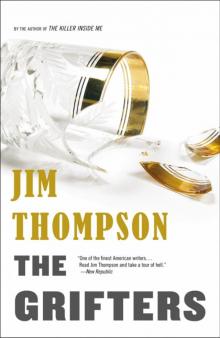 The Grifters
The Grifters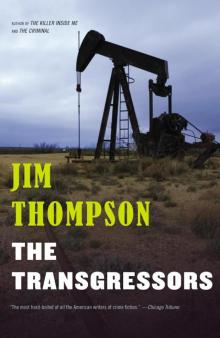 The Transgressors
The Transgressors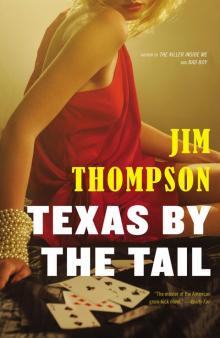 Texas by the Tail
Texas by the Tail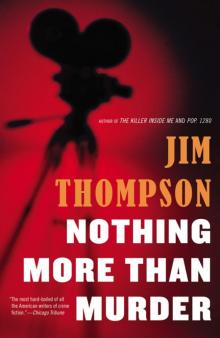 Nothing More Than Murder
Nothing More Than Murder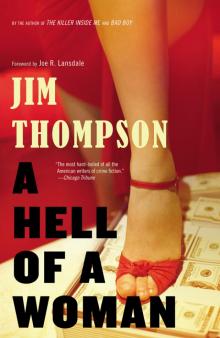 A Hell of a Woman
A Hell of a Woman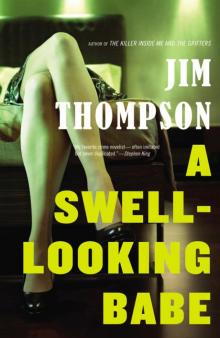 A Swell-Looking Babe
A Swell-Looking Babe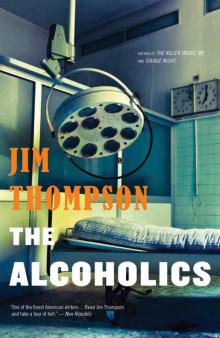 The Alcoholics
The Alcoholics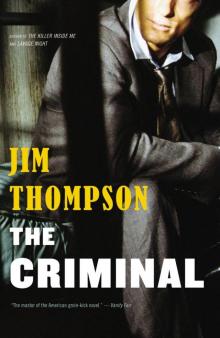 The Criminal
The Criminal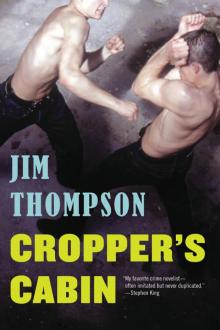 Cropper's Cabin
Cropper's Cabin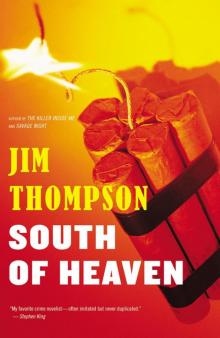 South of Heaven
South of Heaven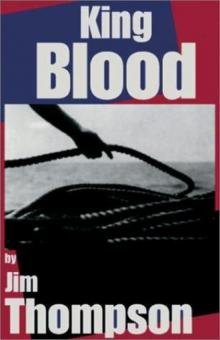 King Blood
King Blood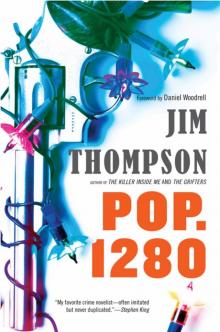 Pop. 1280
Pop. 1280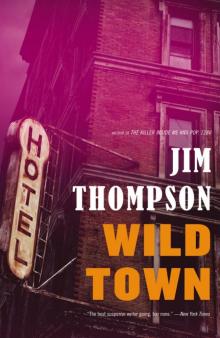 Wild Town
Wild Town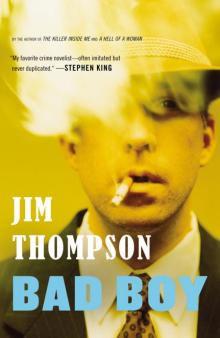 Bad Boy
Bad Boy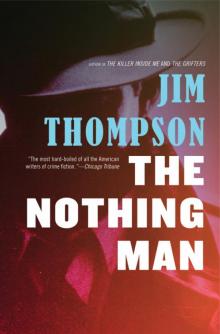 The Nothing Man
The Nothing Man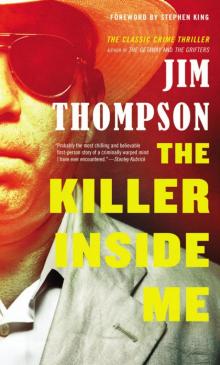 The Killer Inside Me
The Killer Inside Me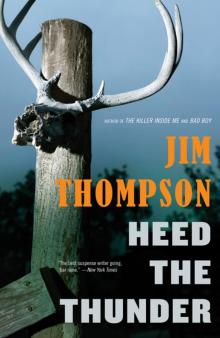 Heed the Thunder
Heed the Thunder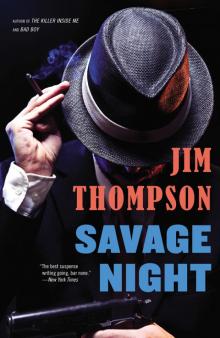 Savage Night
Savage Night Recoil
Recoil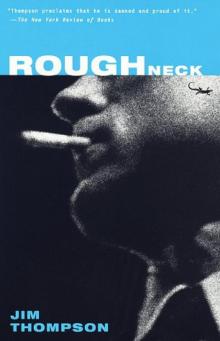 Roughneck
Roughneck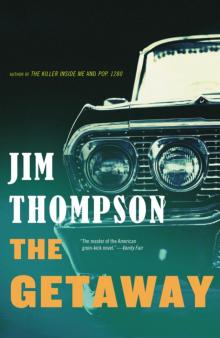 The Getaway
The Getaway